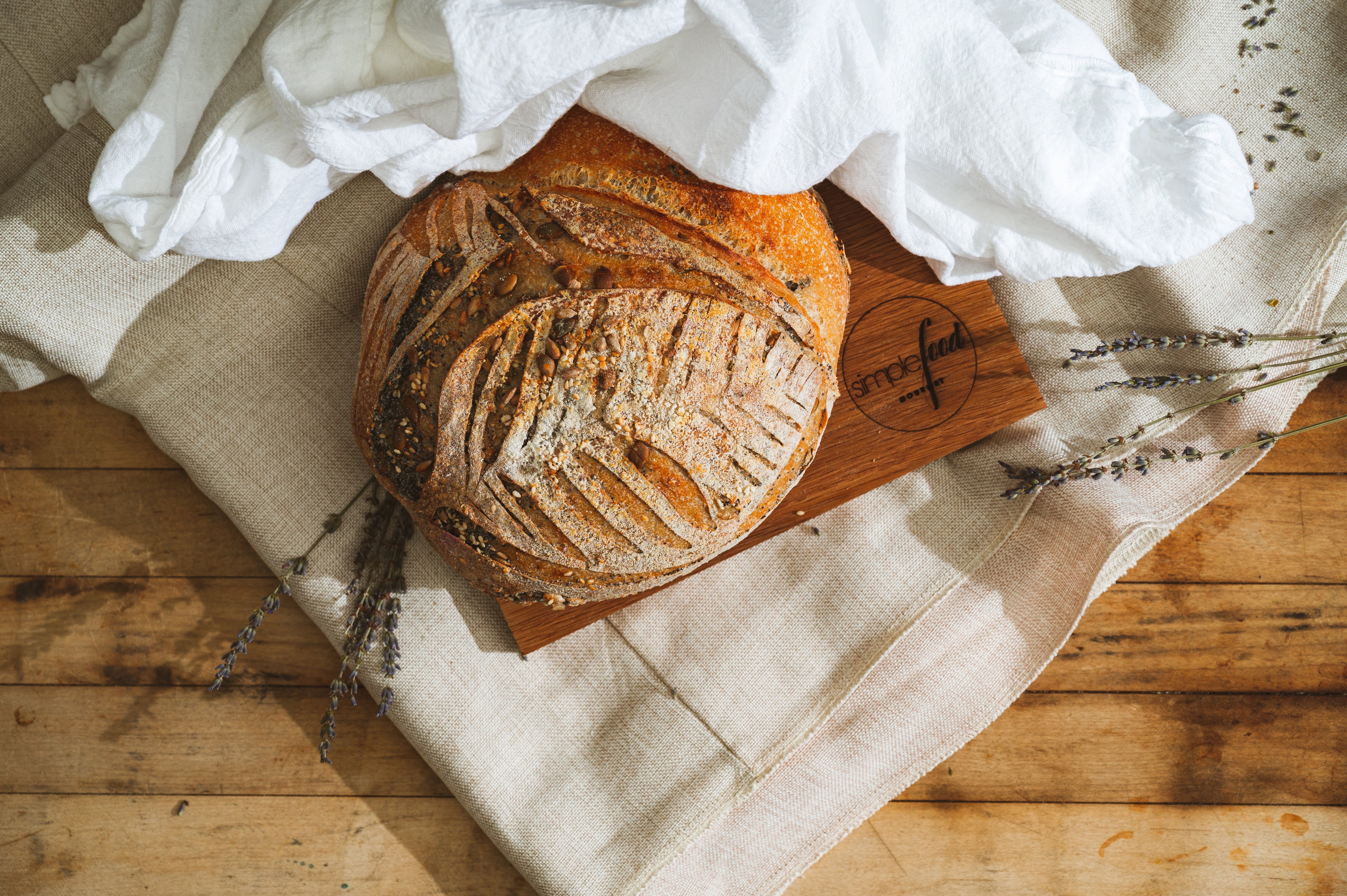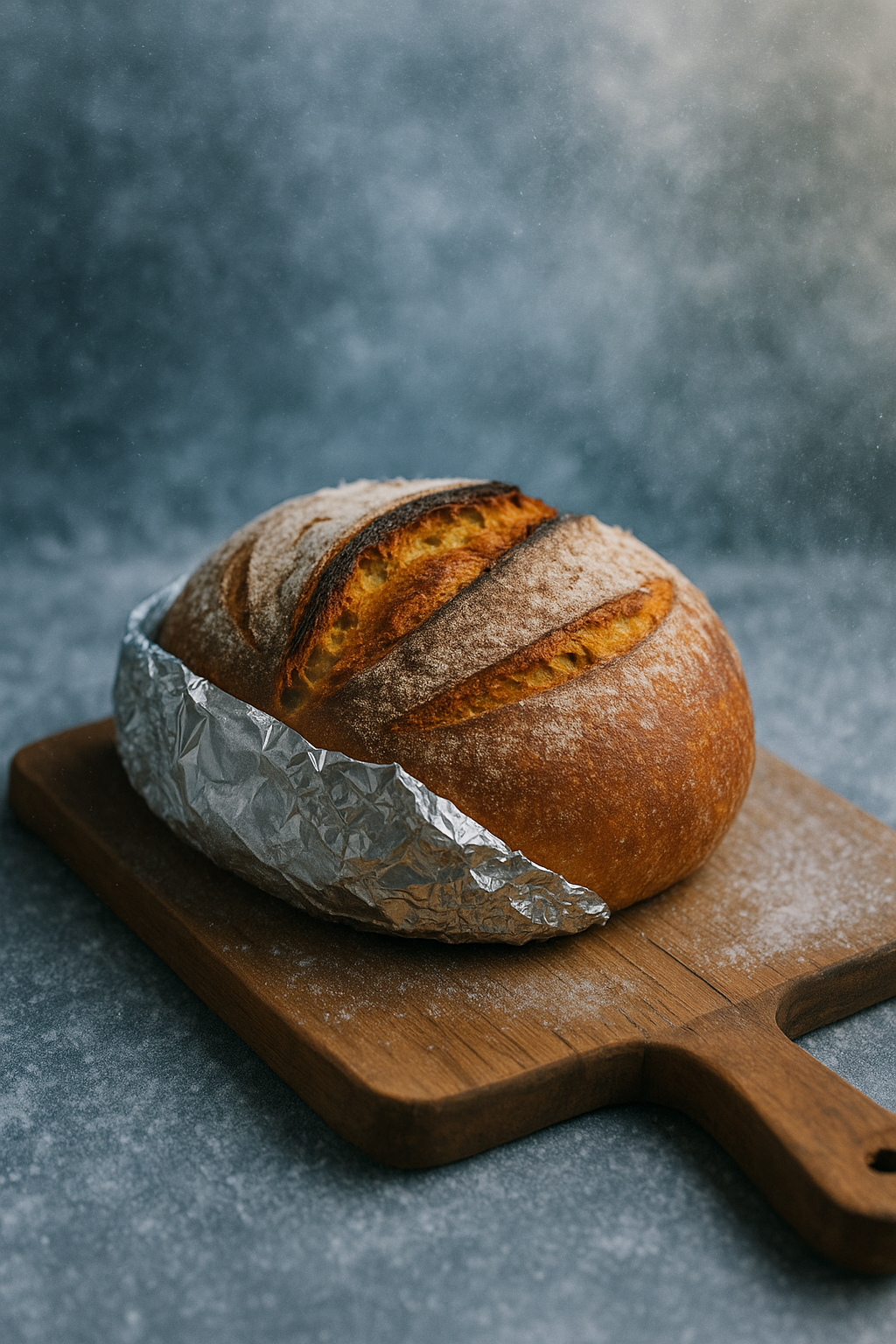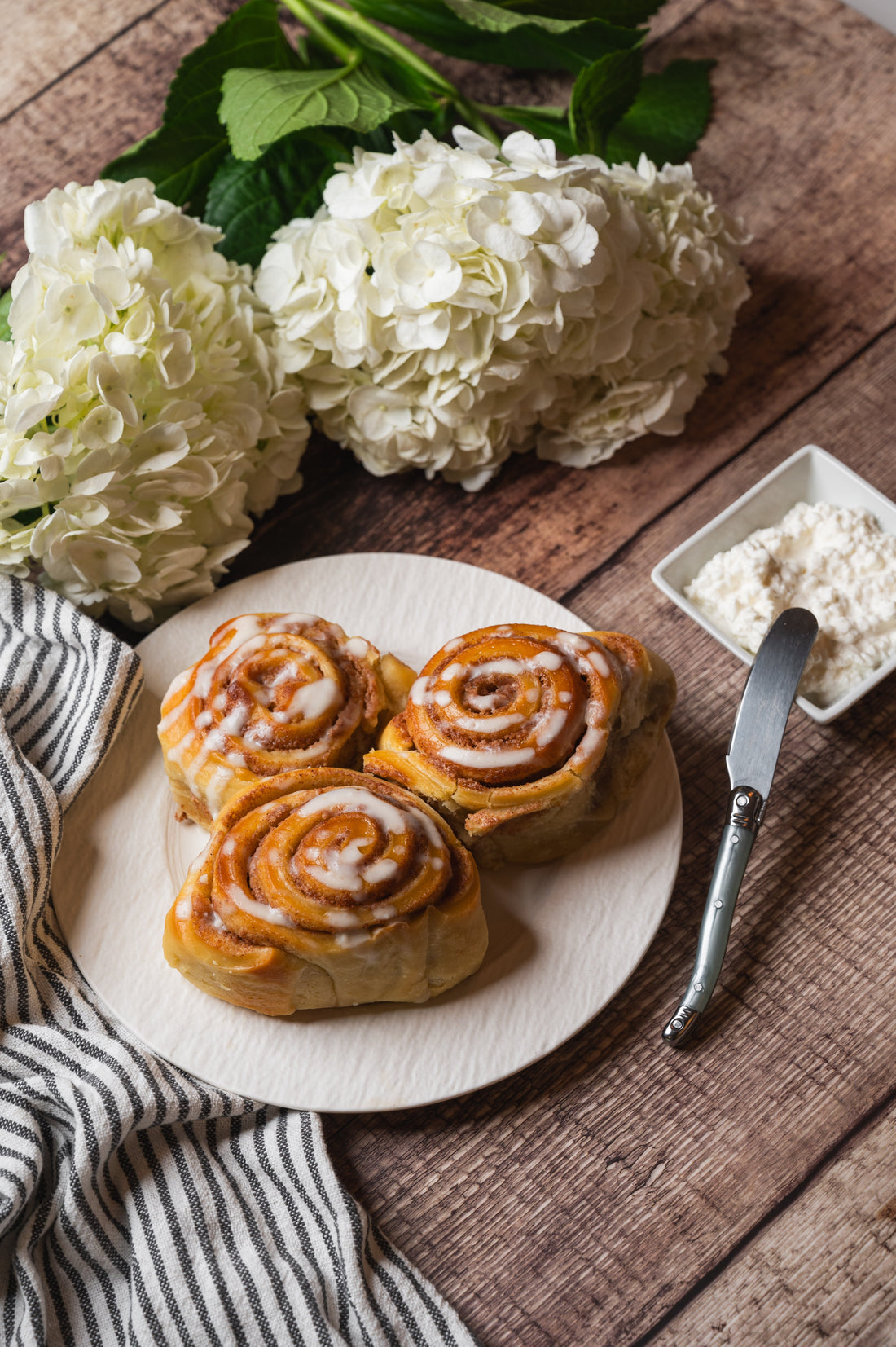In the world of artisanal bread, few loaves are as intriguing as einkorn sourdough. Made with an ancient wheat that dates back thousands of years, this bread combines the tangy complexity of sourdough fermentation with the nutrient‑dense profile of einkorn flour. The result is a loaf with a golden crumb, rich aroma and a nutritional pedigree that outshines most modern breads.
At Simple Food Gourmet, we’re passionate about using heritage grains and slow fermentation to produce bread that nourishes body and soul. This deep dive into einkorn sourdough explores the history and benefits of einkorn, what makes it unique from modern wheat, and how sourdough fermentation unlocks its full potential.
What Is Einkorn?
Einkorn (pronounced EYE‑corn) is one of the earliest cultivated forms of wheat. While modern wheat varieties have been bred for high yields and gluten strength, einkorn has remained relatively unchanged since ancient times. When we talk about ancient grains, einkorn is the quintessential example.
According to nutrition tests, einkorn contains higher levels of protein, essential fatty acids, phosphorous, potassium, vitamin B6 and the antioxidants lutein and beta carotene compared with modern wheat1. Its flour has a high protein and carotene content and a small particle size, which likely contributed to its long history as a “staff of life” in early human diets. These nutrients make einkorn exceptionally nourishing.
In addition to being nutrient‑dense, einkorn’s genetic makeup distinguishes it from common wheat. Modern bread wheat has a more complex genome (with six sets of chromosomes), whereas einkorn is a diploid wheat with only two sets of chromosomes. Because einkorn lacks the D genome, it contains a different type of gluten that is weaker and more water‑soluble. While not gluten‑free, this gluten structure may be easier to digest for some individuals. Many people who struggle with modern wheat find einkorn gentler on their stomachs.
Nutritional Advantages of Einkorn
The nutrient profile of einkorn stands out even among other whole grains. A deep dive into ancient wheat varieties found that einkorn flour is particularly rich in protein, iron, dietary fiber and B vitamins such as thiamine (B1). It also contains significant amounts of lutein, a carotenoid that supports eye health, and other antioxidants. Compared with modern wheat, einkorn has higher levels of phosphorous, potassium, pyridoxine (B6) and beta carotene—nutrients that play roles in energy metabolism, blood pressure regulation and immune support.
Some highlights of einkorn’s nutritional advantages:
-
Protein & amino acids: Einkorn grains have consistently higher protein content than modern wheats; the amino acid profile is similar but the higher protein levels may improve satiety and support muscle maintenance.
-
Essential minerals: Phosphorous and potassium support bone health and cellular function. Vitamin B6 aids metabolism and neurotransmitter synthesis, while iron helps carry oxygen in the blood.
-
Antioxidants: Lutein and beta carotene, abundant in einkorn, are powerful antioxidants that support eye health and may help protect against chronic diseases. Beta carotene is also converted to vitamin A in the body, which is vital for immune function and vision.
-
Better digestibility: Because einkorn’s gluten structure is weaker and more soluble, it can be easier to digest. The grain’s low gliadin content and absence of the D genome may reduce allergenic potential, though people with celiac disease should still avoid gluten‑containing grains.
These nutritional benefits are amplified when einkorn is fermented slowly in a sourdough loaf.
Why Combine Einkorn with Sourdough?
Fermentation is the heart of sourdough baking. A sourdough starter contains a symbiotic culture of wild yeasts and lactic‑acid bacteria. As the starter ferments the dough, it breaks down complex carbohydrates and proteins, producing organic acids that give sourdough its tang and improve texture. When you pair this fermentation with nutrient‑dense einkorn, several benefits emerge:
-
Enhanced nutrient availability: Sourdough fermentation makes fiber and plant compounds more bio‑available and may help stabilize blood sugar. When applied to einkorn, fermentation can unlock its rich supply of minerals and antioxidants.
-
Improved digestibility: The slow fermentation of sourdough begins breaking down proteins (including gluten) and increases vitamin and mineral bioavailability. Combined with einkorn’s weaker gluten, this creates a bread that many people find easier to digest.
-
Lower glycemic impact: Sourdough breads generally have less of an impact on blood sugar compared with commercial breads. The high fiber content of einkorn flour further helps moderate the glycemic response.
-
Complex flavor: Einkorn has a nutty, slightly sweet flavor that shines when fermented slowly. The natural acidity of sourdough balances the grain’s natural sweetness, producing a deep, nuanced taste.
Baking with Einkorn Flour
Baking sourdough with einkorn flour is rewarding, but it requires some adjustments because of einkorn’s unique gluten structure and high protein content. Here are some tips for successful einkorn sourdough baking:
Choose the right flour mix. Many bakers prefer a mix of all‑purpose einkorn and bread flour to balance hydration and structure. You can also use 100% einkorn flour; expect the dough to be stickier and the loaf to have a denser crumb.
Mind hydration. Einkorn absorbs water differently than modern wheat. Start with a slightly lower hydration (around 65–70% water relative to flour) and adjust as you become comfortable with the dough.
Gentle handling. Because einkorn has a weaker gluten network, kneading isn’t necessary. Use stretch‑and‑folds or coil folds to build structure during the bulk fermentation.
Long fermentation. Allow plenty of time for the bulk fermentation and cold proof. A 12–24‑hour cold proof enhances flavor and digestibility.
Bake in a Dutch oven. Steam is crucial for achieving a good oven spring and crust. Baking in a preheated Dutch oven traps steam during the initial bake.
Below is a simple einkorn sourdough recipe to get you started. Feel free to adapt it to suit your schedule or taste.
Ingredients:
-
450 g bread flour (or 100% einkorn if you’re feeling adventurous)
-
50 g whole grain einkorn flour
-
350 g water (adjust down if using 100% einkorn)
-
100 g active sourdough starter
-
10 g sea salt
Method:
-
Autolyse: Combine flours and water, mix gently and let rest for 30 minutes.
-
Mix: Add the starter and salt. Use your hands to squeeze and fold until evenly incorporated. The dough will be sticky.
-
Bulk fermentation: Cover and let the dough rest for 4–6 hours at room temperature, performing gentle stretch‑and‑folds every 30 minutes for the first two hours.
-
Shape: On a lightly floured surface, shape the dough into a tight round. Place seam‑side up in a floured proofing basket.
-
Cold proof: Cover and refrigerate for 12–18 hours.
-
Bake: Preheat your oven to 475°F (245°C) with a Dutch oven inside. Transfer the dough onto parchment paper, score and place into the hot Dutch oven. Cover and bake for 20 minutes. Remove the lid and continue baking for 20–25 minutes until golden brown.
Let the loaf cool fully before slicing to avoid a gummy texture. Baking with einkorn requires patience, but the result is a nutrient‑rich loaf with a buttery crumb and complex flavor.
Einkorn Sourdough in Your Diet
Einkorn sourdough is not just delicious; it’s versatile. Its slightly sweet, nutty profile pairs well with both sweet and savory accompaniments. Try serving slices with:
-
Avocado and tomato. The creamy avocado and acidic tomato complement the bread’s nutty notes.
-
Homemade nut butter and banana. A nutrient‑dense snack for active days.
-
Aged cheeses and charcuterie. The tang of sourdough balances the richness of cheese and cured meats.
-
Eggs and greens. Use einkorn sourdough for toast under a poached egg, sautéed kale and a drizzle of olive oil.
Because einkorn sourdough has a strong nutritional profile and is quite filling, a single slice often satisfies. The high fiber and protein content help promote satiety2, while the antioxidants contribute to overall wellness.
Why Our Einkorn Sourdough Stands Out
At Simple Food Gourmet, we harness the best qualities of einkorn and sourdough to bake bread that feels both ancient and modern:
-
Heritage grain. We source organic einkorn flour, supporting farmers who cultivate ancient wheat using regenerative practices. Organic farming preserves soil health and ensures the grain retains its nutritional value.
-
Extended fermentation. Our doughs ferment for 36–48 hours. This slow process enhances digestion, flavor and nutrient availability.
-
No additives. Our einkorn sourdough contains only flour, water and sea salt. There are no refined sugars, preservatives or industrial enzymes.
-
Small batch baking. Each loaf is shaped and scored by hand. You can taste the care and craftsmanship in every bite.
If you’re local to South Florida, visit us to experience einkorn sourdough fresh from the oven. We also offer nationwide shipping during the cooler months. For home bakers, experimenting with einkorn flour at home is a great way to expand your sourdough horizons.
Frequently Asked Questions
Q: Does einkorn sourdough contain gluten?
A: Yes, einkorn is a form of wheat and contains gluten. However, it lacks the D genome found in modern wheat and has a different gluten structure that many people find easier to digest. If you have celiac disease or severe gluten intolerance, you should avoid einkorn and other gluten‑containing grains.
Q: Is einkorn sourdough healthier than regular sourdough?
A: Einkorn sourdough offers higher levels of protein, B vitamins and antioxidants like lutein and beta carotene compared with breads made from modern wheat. When combined with sourdough fermentation, these nutrients become more bio‑available and the bread may be easier to digest. However, “healthy” also depends on your dietary needs—variety is key.
Q: Why is einkorn sourdough more expensive?
A: Einkorn is an ancient grain that yields less per acre than modern wheat. It’s grown by small farmers using traditional methods, and the flour milling process is slower due to einkorn’s tiny grains. These factors make it more expensive to produce. We believe the nutritional benefits and unique flavor justify the cost.
Q: Can I substitute einkorn flour 1:1 in my sourdough recipe?
A: Einkorn absorbs water differently and has weaker gluten. If you substitute it one‑for‑one, be prepared for a stickier dough and a denser crumb. It’s often easier to start by replacing 10–20% of your flour with einkorn and gradually increasing as you become comfortable with its behavior.
Q: How should I store einkorn sourdough bread?
A: Like other sourdough breads, einkorn sourdough will stay fresh at room temperature for two to three days. For longer storage, freeze the loaf. Cool it completely, wrap it in foil or beeswax, place it in a freezer‑safe bag and remove as much air as possible. Frozen einkorn sourdough stays fresh for up to two months when packaged well.
Embracing Ancient Grains
Einkorn sourdough bread invites us to slow down and appreciate the wisdom of ancient grains. While modern agriculture favors high‑yielding wheat varieties, heritage grains like einkorn remind us of a time when flavor and nourishment were priorities. Combined with the art of sourdough fermentation, einkorn offers a bread that is rich in history, flavor and nutrition. Whether you’re a seasoned baker or a curious foodie, adding einkorn sourdough to your repertoire is a delicious way to connect with our culinary past while nourishing your body in the present.
Check Out Our Best Selling Sourdough Flavors:
Nero Sourdough Loaf | Turmeric & Pumpkin Seeds Sourdough Loaf | Original Pink Salt Sourdough Loaf | Kalamata Olives & ZAATAR Sourdough Loaf
Sources:
-
Einkorn is a more nutritious grain than modern wheat; it contains higher levels of protein, essential fatty acids, phosphorous, potassium, vitamin B6, lutein and beta carotene. The grain has a different gluten structure and lacks the D genome, making it easier to digest.
-
Einkorn flour is rich in protein, iron, dietary fiber, thiamine and other B vitamins; it contains a significant amount of lutein and other antioxidants. It has higher levels of phosphorous, potassium, pyridoxine and beta carotene than modern wheat, and its protein and mineral content are consistently higher draxe.com. The gluten in einkorn is weaker and more water‑soluble, making it easier to digest draxe.com.
-
Slow fermentation makes fiber and plant compounds more bio‑available, supporting gut health and moderating blood sugar levels bbcgoodfood.com; it also increases vitamin and mineral bioavailability and begins breaking down proteins, making sourdough easier to digest bbcgoodfood.com.
-
Sourdough bread tends to be more satiating than yeast‑leavened bread; participants in one study reported lower hunger after eating sourdough bbcgoodfood.com.
-
To freeze a whole loaf of sourdough (including einkorn), cool it completely, wrap it in foil or plastic wrap, place it in a freezer bag and remove as much air as possible; sourdough can be frozen up to two months for best quality pantrymama.com.
- When wrapped well, sourdough can remain frozen for up to six months, though quality is best if consumed within two months farmhouseonboone.com.








1 comment
As a born and raised Northern California resident, I fell in love with sourdogh bread and there was both good and not so good to purchase. I lived in alaska for a year and making bread was a winter time hobby for many. that’s the first time i attempted making sourdough bread. I was and still am a novice and I have lived in many states but find that one of the things I miss, as now a former Californian, is some good old sourdogh. I now share a home in the suburbs of Atlanta GA, with my daughter and my two grandsons.My daughter is a graduate of a culinary school in Portland Oregon and we have been discussing making some sourdough bread here at our home. I thoroughly enjoyed reading your article on Einkorn sourdough and plan on ordering from your bakery when you start shipping. We would also appreciate your advice on obtaining a sourdough starter kit or staring our own here at home? Look forward to trying your sea salt sourdough bread.
Sincerely,
Randal tharp
Lawrenceville, GA